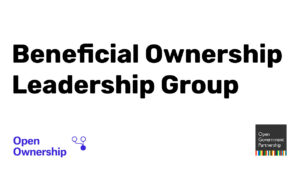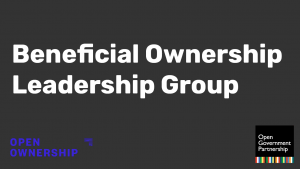Beneficial Ownership Leadership Group: Impact, Achievements, and Future Directions
Overview
Launched in 2019, the Beneficial OwnershipDisclosing beneficial owners — those who ultimately control or profit from a business — is essential for combating corruption, stemming illicit financial flows, and fighting tax evasion. Technical... More Leadership Group (or the Leadership Group) set out to advance global policy toward open beneficial ownership (BO) data, and achieve concrete progress by 2023. At its inaugural meeting in the 2019 OGP Global Summit in Ottawa, Canada, 11 national governments voiced support, with eight—Armenia, Kenya, Latvia, Mexico, Nigeria, Norway, the Slovak Republic, and the UK—becoming formal members. These countries committed to advancing public access to BO data, sharing best practices, and implementing structured, linkable, and verified data; they embedded these reforms in their OGP action plans, working alongside civil society. This summary examines the group’s achievements, lessons learned by Open Ownership (OO) and the Open Government PartnershipThe Open Government Partnership (OGP) is a multi-stakeholder initiative focused on improving government transparency, ensuring opportunities for citizen participation in public matters, and strengthen... More (OGP) from co-convening the group, and future directions to advance BO reform.
Impact
During its four-year mandate, the Leadership Group organised high-level and technical exchanges, significantly advancing BOT within member countries and globally.
Nigeria used the platform to support political discussions and technical exchanges to advance its BOT reforms, culminating in the launch of Africa’s first freely accessible public BO register. The success of its cross-sector approach earned Nigeria an OGP Impact Award. Armenia leveraged the Leadership Group for its ambitious reform agenda, resulting in an economy-wide BO register that is now being integrated with its public procurement portal. Mexico has been implementing the Beneficial Ownership Data Standard (BODS) to consolidate BO information into a comprehensive national register.
Latvia, the Slovak Republic, and the UK showcased innovative domestic reforms, and Kenya and Norway contributed to technical discussions. For example, the UK shared progress of its widespread legal reforms to verify BO information. Members including Armenia, the UK, and Norway emphasised the need for international action, facilitating dialogue with international institutions including the Financial Action Task Force and IMF, and strengthening representation of BOT in initiatives such as the Summit for Democracy.
Lessons learned
One lesson learned is the value of broadening dialogue at key moments to include governments beyond the Leadership Group. This allowed members to showcase and learn from innovations happening in real time. For example, the former Secretary of Transparency of Colombia leveraged a high-level event in 2021 to announce the country’s new BO law, and at a high-level Leadership Group event in July 2022, Richard Nephew, the US Department of State’s Global Anti-Corruption Coordinator, shared US efforts to improve BO transparencyAccording to OGP’s Articles of Governance, transparency occurs when “government-held information (including on activities and decisions) is open, comprehensive, timely, freely available to the pub... More in real estate. The group’s technical support also evolved, shifting from group-wide meetings to targeted small-group exchanges that better met participants’ needs to explore specific implementation issues. A bilateral exchange between Latvia and Nigeria, for instance, assisted Nigeria in resolving technical issues with BODS implementation.
These lessons from the Leadership Group are now informing new initiatives, such as the African Beneficial Ownership Transparency Network convened by the African Development Bank and the UK Government.
Where next?
As the Leadership Group concluded in December 2023, consultations with members revealed a shift in needs, driven by changes in the BOT reform context. Over 80 countries now have a live BO register, with 70 more planning or implementing one. The pandemic underscored the importance of knowing who owns companies providing government services, while Russia’s invasion of Ukraine highlighted security risks of anonymously-owned companies. Climate change and sustainable energyEnsuring universal access to sustainable, dependable, and affordable energy is critical to every aspect of prosperity. Increasing public oversight and transparency in the energy sector can help to ens... More transitions have also brought new actors into the BOT agenda.
In consultations, Leadership Group members supported a more flexible approach that enables broader country participation. Members expressed a desire to participate in targeted technical exchanges with countries facing similar issues, rather than only with Leadership Group countries. Therefore, these exchanges will be mainstreamed through OO’s technical assistance and capacity-building programmes with the World Bank, the UN Office on Drugs and Crime, and the African Development Bank.
However, members also highlighted the continued need for a political platform to sustain BOT momentum internationally. In the coming months, OO and OGP will continue to convene opportunities for countries to demonstrate political leadership and advance BOT reforms.
BOT remains high on the international agenda. The 10th Conference of States Parties to the UNCAC in 2023 saw a new resolution dedicated to BOT, and the G7 Finance Ministers’ statement in April 2024 emphasised the need for effective BOT implementation. The International Anti-Corruption Conference in June is an opportunity to transform dialogue into action.
OO and OGP look forward to continued collaboration with reformers in government, civil society and international partners to support ambitious and impactful BO reforms.

No comments yet
Related Content

Beneficial Ownership Leadership Group
The Beneficial Ownership Leadership Group came together in 2019 to drive the global policy shift towards free, open beneficial ownership data.
Open Gov Guide 2024 – Company Beneficial Ownership

Four Ways Beneficial Ownership Transparency Can Benefit the Extractive Industries and Beyond
See how OGP members are making progress on beneficial ownership transparency, a key tool for combating tax evasion and stopping illicit financial flows.


Leave a Reply